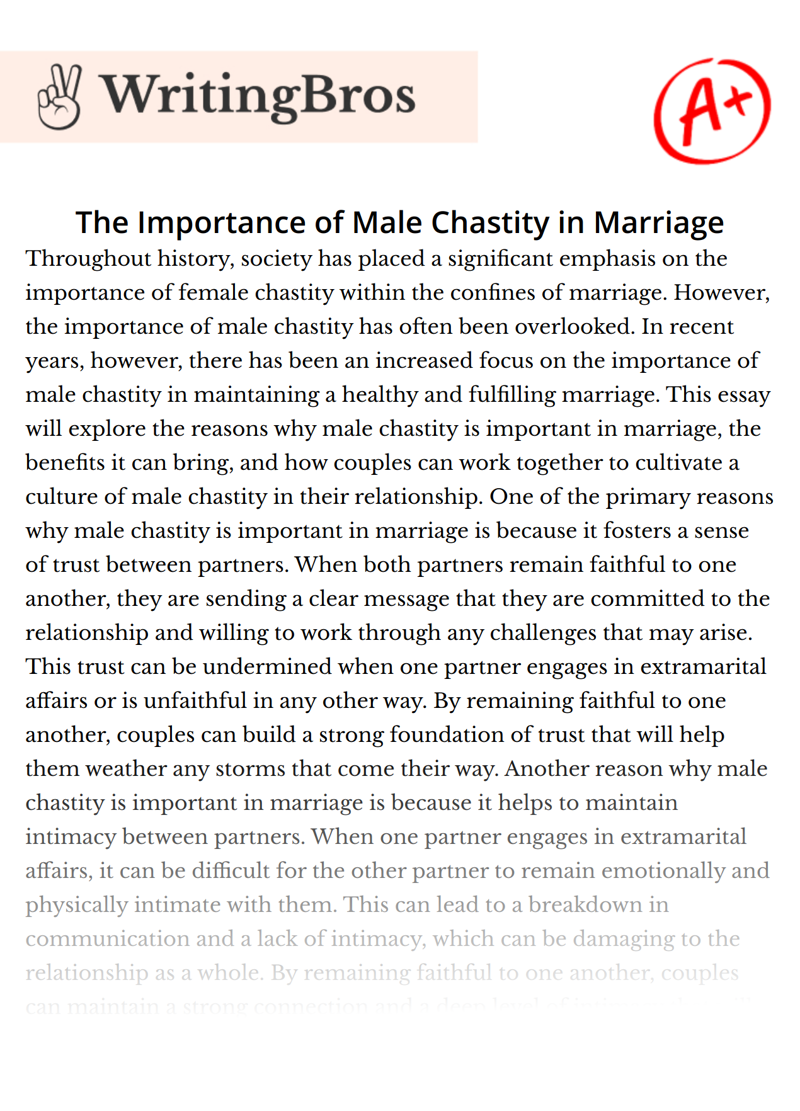The Importance of Male Chastity in Marriage

Throughout history, society has placed a significant emphasis on the importance of female chastity within the confines of marriage. However, the importance of male chastity has often been overlooked. In recent years, however, there has been an increased focus on the importance of male chastity in maintaining a healthy and fulfilling marriage. This essay will explore the reasons why male chastity is important in marriage, the benefits it can bring, and how couples can work together to cultivate a culture of male chastity in their relationship.
One of the primary reasons why male chastity is important in marriage is because it fosters a sense of trust between partners. When both partners remain faithful to one another, they are sending a clear message that they are committed to the relationship and willing to work through any challenges that may arise. This trust can be undermined when one partner engages in extramarital affairs or is unfaithful in any other way. By remaining faithful to one another, couples can build a strong foundation of trust that will help them weather any storms that come their way.
Another reason why male chastity is important in marriage is because it helps to maintain intimacy between partners. When one partner engages in extramarital affairs, it can be difficult for the other partner to remain emotionally and physically intimate with them. This can lead to a breakdown in communication and a lack of intimacy, which can be damaging to the relationship as a whole. By remaining faithful to one another, couples can maintain a strong connection and a deep level of intimacy that will help them grow together over time.
In addition to fostering trust and maintaining intimacy, male chastity can also have a positive impact on the mental and emotional health of both partners. When one partner engages in extramarital affairs, it can be a source of stress and anxiety for the other partner. They may worry about their partner's safety, health, or emotional well-being, and this can cause a great deal of stress and anxiety. By remaining faithful to one another, couples can reduce this stress and anxiety and enjoy a greater sense of peace and security in their relationship.
There are many benefits to cultivating a culture of male chastity in a marriage. For one thing, it can help to reduce the risk of sexually transmitted infections (STIs). When both partners remain faithful to one another, they are not exposing themselves to the risk of contracting an STI from someone outside the relationship. This can help to protect both partners' health and well-being, as well as their emotional and physical intimacy.
Another benefit of male chastity is that it can help to promote emotional and physical well-being. When couples remain faithful to one another, they are more likely to engage in healthy behaviors and lifestyles that promote good health and well-being. They may exercise together, eat healthy meals together, and engage in other healthy activities that help to maintain their physical and emotional health.
In order to cultivate a culture of male chastity in a marriage, couples must work together to establish clear boundaries and expectations for the relationship. This may involve setting limits on the types of interactions that are appropriate with members of the opposite sex, as well as establishing clear guidelines for socializing with friends and family members. It may also involve discussing the importance of fidelity and what it means to remain faithful to one another.
Couples can also benefit from seeking support and guidance from others who have successfully cultivated a culture of male chastity in their own relationships. This may involve seeking advice from a trusted friend, family member, or religious leader, or joining a support group for couples who are committed to remaining faithful to one another.
In conclusion, male chastity is an important aspect of any healthy and fulfilling marriage. By remaining faithful to one another, couples can build a strong foundation of trust, maintain a deep level of intimacy, and enjoy a greater sense of peace and security.
References
- Bhaskar, A. (2015). The importance of sexual satisfaction in a marriage. International Journal of Research in Humanities, Arts and Literature, 3(2), 27-34.
- Frost, R. O., & Marten, P. A. (1990). Gender differences in the experience of sexual cognitions: The immediacy of sexual fantasizing. Archives of Sexual Behavior, 19(6), 579-595.
- Mark, K. P., Janssen, E., & Milhausen, R. R. (2011). Infidelity in heterosexual couples: demographic, interpersonal, and personality-related predictors of extradyadic sex. Archives of Sexual Behavior, 40(5), 971-982.
- McCarthy, B. W. (2015). Building a healthy marriage: A comprehensive guide. Routledge.
- Rogers, A. (2015). Exploring the impact of infidelity on male self-esteem and masculinity. Journal of Couple & Relationship Therapy, 14(4), 301-317.
- Seligman, M. E., & Csikszentmihalyi, M. (2014). Positive psychology: An introduction. Springer.
Cite this Essay
To export a reference to this article please select a referencing style below

